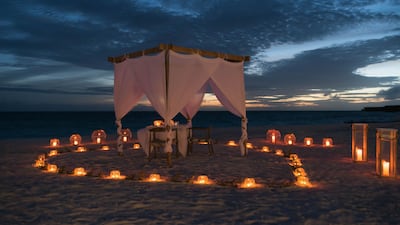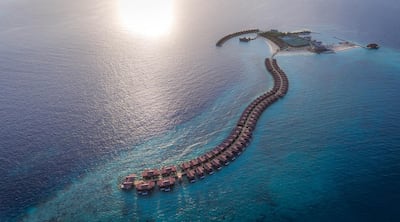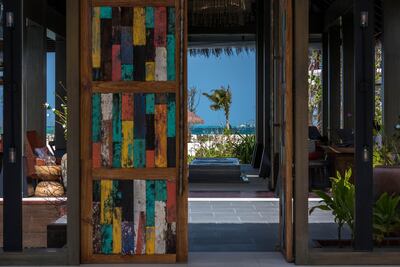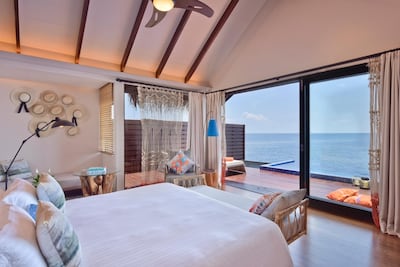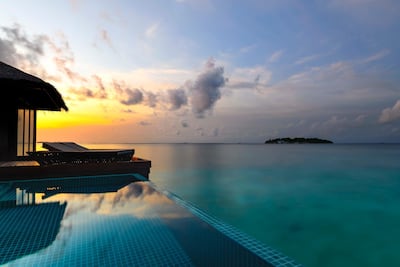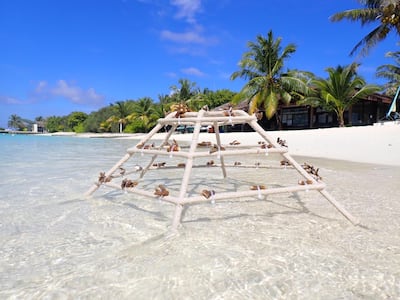Safely ensconced behind a face mask and face shield, and feeling like a second-rate Darth Vader, I navigate my way through Dubai International Airport for the first time in 11 months. What was once second nature now feels foreign – the shadow of Covid-19 falling across every surface I touch and every person I interact with.
But I am heading to the Maldives. And surely, if any place on Earth can offer respite from our current virus-ridden reality, it is the sun-drenched Indian Ocean archipelago where social distancing occurs by default and outdoor island living offers the ultimate antidote to global lockdowns and stay-home orders.
“When you have lockdown restrictions in big cities, you are dreaming about the Maldives – its tropical winds, scattered islands and villas that have a minimum seven or eight metres between them,” notes Raffaele Solferino, general manager of Grand Park Kodhipparu, my first port of call.
His claim is backed by the 75 per cent occupancy the resort is enjoying during my stay, with Indians and Russians forming the bulk of visitors. I am not alone, it seems, in perceiving the Maldives as a safe bet in a turbulent travel landscape.
The archipelago became one of the first destinations in the world to resume "normal" operations when it reopened its borders to tourists in July. All visitors must show proof of a negative PCR test, taken at least 96 hours prior to arrival, and fill in an online health declaration form. This yields an individualised bar code that must be presented upon arrival.
While the Maldives’ densely populated capital, Male, has had to contend with spikes in Covid-19 cases, movement between the capital and resort islands is severely restricted for locals and hotel staff, and international arrivals bypass it altogether – I am whisked out of the airport departure area, across a road and straight on to the Grand Park’s speed boat in a matter of minutes. Less than half an hour later, I am stepping on to the powdery sands of Kodhipparu.
There is something reassuring about being cocooned on an island during a pandemic. While Covid-19 is no respecter of geographical boundaries, there’s a sense of security that comes from being surrounded by water on all sides, with unobstructed views that roll out towards the horizon. This is particularly true at Grand Park Kodhipparu, which is set on a smidgen of land, barely 500 metres squared. The resort is small and intimate, with only 120 villas in total, and you could happily spend a whole day without engaging with another soul, should you so desire.
Oversized flamingo floats in the communal pool, a live DJ spinning house tracks in the evenings, and an Instagram-friendly swing suspended from a palm tree on a secluded stretch of beach all hint at the resort’s attempts to appeal to a younger, hipper crowd. It’s a vibe that’s built into the Grand Park’s design (conceptualised by industry stalwarts Hirsch Bedner Associates), from the jaunty tiles on the bathroom floor of my Reef Pool Water Villa, to the macrame wall hangings and neutral-toned Scandi-chic styling.
There’s a wellness slant, too, with daily yoga classes offered for free, a concerted focus on sourcing fresh, local produce where possible, and the use of 100 per cent organic Comfort Zone products in the spa.
That’s not to say you can’t indulge. At Firedoor, the resort’s fine dining restaurant, a show kitchen sits above an open stretch of water, where a visit from a pair of blacktip reef sharks adds further drama to an already stunning setting. One of the finest steaks I have ever eaten, cooked on a special Josper grill and served on a hot stone, is promptly followed by a decadent chocolate fondant.
Restaurants at the resort have all been reconfigured to ensure you never feel like you are too close to anyone else, although a sense of spaciousness is already inherent in the towering ceilings and open-to-the-elements design of each of the Grand Park's three dining outlets.
Staff all wear face masks, physical menus have been eliminated and disinfection drives are carried out on a regular basis. While guests are not obliged to wear masks when moving around the resort, they are mandatory when entering restaurants, the gift shop and other closed spaces.
Next on my itinerary is the Sheraton Full Moon Resort & Spa, which also has the advantage of being close to the airport. In this instance, the Male skyline is visible from parts of the island, although carefully disguised from certain vistas to ensure you still feel like you are far removed from the rest of civilisation.
Here, too, the Maldives’ success in convincing travellers that it is a safe haven is clear to see.
“We thought we would be lucky to have 30 per cent occupancy for December, January, February, with a decline in April and a pick-up towards the end of the year,” the resort’s general manager, Emilio Fortini, tells me. “Then all of a sudden, it just turned around. In mid December, we were full and have been ever since. So it has recovered unusually quickly, very unexpectedly, not just for the Sheraton, but for the Maldives as a destination.
“The allure of the Maldives is that you have all these open-air spaces, and everyone that comes here has to have a negative PCR test. So it feels like a safe destination relative to other places,” he adds.
Across the Maldives, PCR tests are conducted in the resorts for departing visitors, and anyone that tests positive is required to quarantine on the island for 14 days. Nonetheless, if there is a weak spot in this otherwise glowing success story, it is that the airport on our return journey is jam-packed, and more could be done to ensure social-distancing guidelines are enforced.
While hoteliers in the Maldives had braced themselves for a slow return to form, they have now been grappling with a new, unexpected set of challenges. Many resorts cut down on staff numbers at the height of the pandemic, so are operating with smaller teams, while fewer flights coming in to the Maldives means the supply of goods has been disrupted, sometimes making it difficult to source specific items.
“There was a period of two or three months where we could hardly get anything,” Fortini admits, although this is certainly not evident at the Sheraton's lavish breakfast buffet, where fresh fruit, pancakes, waffles and jars of muesli jostle for space with dosas, gluten-free muffins, servings of eggs Benedict and countless other morning treats.
The Sheraton is a resort hotel in the more typical sense – bigger, with more guests, so social distancing requires a more strategic approach. Recognising one particular bottleneck, the hotel has placed a document in rooms warning against the breakfast rush, encouraging people to go as early as possible to avoid the crowds.
The size of the resort means there is something for everyone, including five restaurants, dishing up Thai, Chinese, Caribbean, Mediterranean and international delicacies.
There are also customised dining experiences – a picnic on a secluded sand bank across from the resort’s main bay, reached by speed boat, feels gloriously decadent, while lunch in the bay, where tables are partly submerged in the sea, is the stuff Instagram dreams are made of.
There are quieter stretches of beach for those seeking privacy, and more social spaces for those who can still tolerate being anywhere near strangers. An expansive kids' club provides entertainment for the little ones, but there is also plenty to keep the adults occupied.
After a trip to the spa, I try my hand at traditional Maldivian palm frond weaving, unsuccessfully trying to create a simple braid while Hakim, our erstwhile guide, whips up an entire fedora in record time. A snorkelling trip to the nearby Kurumba reef brings me up close and personal with more blacktip reef sharks, and I take part in the resort’s coral preservation programme, attaching fragments to a customised frame in support of the resort’s efforts to preserve and propagate coral populations in the surrounding seas.
My beachfront villa looks out over a palm-tree-covered expanse leading down to the beach. On the final night of my stay in the Maldives, I sit on my patio, listening to the sound of lapping waves interspersed with the laughter of a group of guests in a nearby villa. Fittingly, given the name of the resort, a full moon hangs in the sky overhead.
And, just for a moment in time, it is possible to pretend that the world is normal again.




